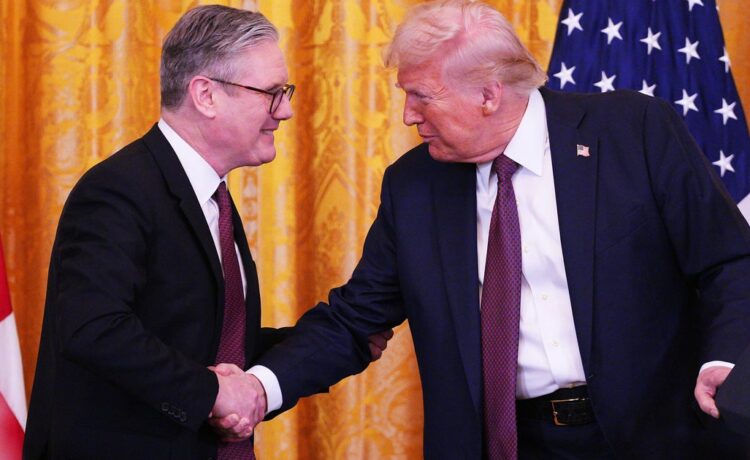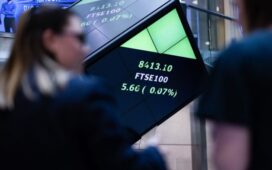Stocks closed modestly higher on Thursday after President Trump announced a new trade agreement with the United Kingdom.
The S&P 500 gained 33 points, or 0.6%, to close at 5,664, while the Dow Jones Industrial Average rose 254 points, or 0.6%, to 41,368 points. The Nasdaq Composite added 1.1%.
Bitcoin and crude oil prices climbed in wake of the deal, while gold prices dipped, a sign of rising investor confidence in riskier assets. Treasury yields rose as investors bet that the U.S. will notch more trade deals with other countries and that the Federal Reserve won’t need to cut interest rates as sharply in order to prop up the economy, according to the Associated Press.
Mr. Trump announced the trade deal with the United Kingdom Thursday morning from the Oval Office, saying it will include “billions of dollars of increased market access for American exports, especially in agriculture.” He added that the U.K. will eliminate non-tariff barriers that “unfairly discriminated against American products.”
A 10% baseline U.S. tax on imports from Britain and other countries, imposed by the Trump administration in April, will remain in place. But under the plan, the first 100,000 vehicles exported to the U.S. from British automakers each year are subject to that 10% rate, and additional vehicles will face 25% rates, according to the White House.
“We still have our 10% tariff on which will produce $6 billion of revenue for the United States,” Commerce Secretary Howard Lutnick said during the White House briefing on Thursday.
In April, the Trump administration placed a 10% tax on imports from Britain, as well as 25% tariffs on autos, steel and aluminum, delivering a blow to the U.K., which exports a large percentage of British cars to the United States. British cars accounted for more than a quarter of U.K. auto exports in 2024, according to the U.K.’s Office for National Statistics.
After announcing the U.S.-U.K. trade pact from the White House on Thursday, Mr. Trump urged Americans to buy stocks before more trade deals are announced and before the reconciliation bill is passed.
“You better go out and buy stock now,” Trump said. “Let me tell you, this country will be like a rocket ship that goes straight up.”
House Speaker Mike Johnson, a Louisiana Republican, said during a weekly news conference on Tuesday that he thinks the lower chamber can complete its work on the budget resolution by Memorial Day.
The timeline for trade deals remains up in the air, although Mr. Trump said there are “many more to come” in a Truth Social post.
Expect more volatility
While the market was off to a strong start Thursday morning ahead of the U.S.-U.K. trade deal announcement, Solita Marcelli, chief Investment officer Americas at UBS Global Wealth Management, said Wall Street should expect headwinds.
“While we continue to expect a variety of deals or sector carve-outs to materialize before the 90-day pause period ends in July and maintain our conviction in the secular AI trend, we think investors should be prepared for volatility,” she wrote in an email.
Earlier this week, Treasury Secretary Scott Bessent told the House committee Tuesday that the U.S. has 18 “important trading relationships” and is currently negotiating with 17 to reach deals.
The U.S.-U.K. deal could be an encouraging start, but bigger trading partners could offer bigger hurdles, including China.
The world’s second-largest economy again on Thursday called on the United States to cancel its tariffs, ahead of talks between Treasury Secretary Scott Bessent and a high-level Chinese delegation this weekend, which the Trump administration announced Tuesday.
Meanwhile, Trump on Wednesday said that he wouldn’t reduce his 145% tariffs on Chinese goods as a condition for negotiations. China has also re-upped its call for the U.S. to slash its unilateral tariffs.
In a press briefing Thursday, Commerce Ministry spokesman He Yadong told reporters that the US “needs to show sincerity to talk and be prepared to rectify its wrongdoing and cancel unilateral tariffs,” according to Bloomberg.
Citing uncertainty around the Trump administration’s trade policies, the Federal Reserve announced Wednesday that it would leave its benchmark interest rate at its current range of 4.25% to 4.5%.
contributed to this report.





